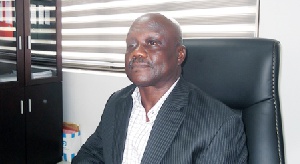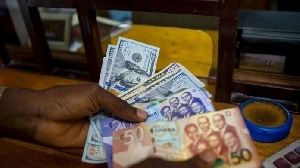Politics of Tuesday, 28 April 2015
Source: The Inquisitor
Duffuor's IFS in dirty fight
The machinations against the Mahama administration are getting dirtier each passing day.
What is amazing is the fact that the persons who have benefitted in one way or the other are the very ones embarking on the heinous agenda to make appointees of the government and administration unpopular.
One of such persons is no other person than Professor Newman Kusi, who is the Executive Director of the Institute of Fiscal Studies (IFS), a think-tank which was established by Dr. Kwabena Duffuor, former Minister of Finance and Economic Planning.
Prof. Newman is picking issues with the current Minister of Finance and Economic Planning, Mr. Seth Terkper, over matters which insiders say are just trivial and smacks of somebody who is peeved over nothing.
Insiders believe that Prof. Kusi is peeved with Mr. Terkper because the minister has blocked Prof. Kusi's avenue of getting consultancy jobs at the ministry.
Before Mr. Terkper took over as the Finance Minister, works that were supposed to be done by some officials at the ministry were issued out to the same officials as consultancy works.
It is instructive to know that Prof. Kusi worked as Special Assistant to Dr. Duffuor when he was the Minister of Finance and Economic Planning.
Prof. Kusi says the Institute of Fiscal Studies (IFS) is going to seek legal action to compel Finance Minister, Seth Terkper, to admit to allegedly causing financial loss to the state over his failure to hedge Ghana's crude oil.
Prof. Kusi said on Kumasi-based Ultimate FM, which is owned by his boss, Dr. Duffuor, that the honourable thing for him [Terkper] to do is to resign, contending that "when he resigns at least the position will be left vacant and maybe we will get somebody who would ensure this does not repeat itself."
Last month, two think-tanks – the IFS and IMANI-Ghana - at a joint press conference, accused the Finance Minister of causing financial loss of GHc2.7 billion (equivalent to 1.7 percent of GDP) to the state with his failure to hedge oil prices on the international market.
Hedging is a risk management strategy used in limiting or offsetting the probability of loss from fluctuations in the prices of commodities, currencies, or securities.
In effect, hedging is a transfer of risk without buying insurance policies.
The IFS, which is now in bed with IMANI Ghana, although got response from the Ministry of Finance and Economic Planning, has decided not to take any word from the response.
Insiders say that Prof. Kusi was just blowing hot air as the government position on hedging was not a personal position of Mr. Terkper . IFS and IMANI Ghana held a press conference accusing the minister of causing financial loss to the state because his ministry refused to hedge for crude oil.
As if by design, the two think-tanks refused to hook up with the Ministry of Finance and Economic Planning to know what the actual position was before going public with the issue on hedging, which virtually came back to hit them in the face.
IMANI Ghana has since the explanation and reaction from the ministry, been quiet on the issue of hedging.
The IFS in a clear personality worship game plan, which has always used periods of Dr. Duffour's presence at the finance ministry to do analysis as if nothing better has happened under the current minister's regime.
It is interesting to know that hedging programme did not stop immediately Dr. Duffuor left office, but rather it continued with the programme until 2013.
Records indicate that in spite of the active implementation of the hedging programme in 2012, Ghana had one of the worst deficits from which the economy is still recovering.
Meanwhile, Prof. Kusi has become the laughing stock of some lawyers in the country with his empty legal action threat against Mr. Terkper.
According to the lawyers, Prof. Kusi's position is just laughable as the minister could not be held liable for working with a Cabinet decision.
The Institute for Fiscal Studies (IFS) was established in Ghana in March 2013 as a politically independent non-profit think-tank devoted to the provision of economic policy advice, advocacy and world-class training based on practical experience and insights developed through quality research and analysis.
The Institute seeks to conduct high-quality independent research into macroeconomic and fiscal policy management to promote better understanding of the Ghanaian economy in general, and government finances in particular, for the benefit of government, the business community, and civil society.
It also provides fora for public discussions and reflections on the country's macroeconomic policy and public finance. In addition, the Institute provides advisory services on macroeconomic and fiscal policy design and management.











